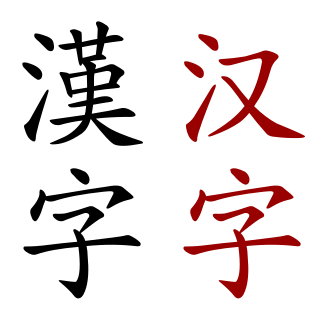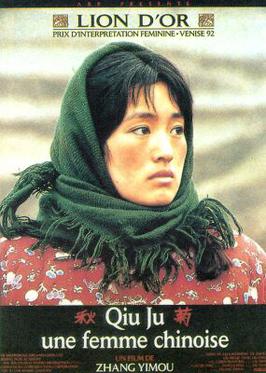
Chinese characters are logographs used to write the Chinese languages and others from regions historically influenced by Chinese culture. Chinese characters have a documented history spanning over three millennia, representing one of the four independent inventions of writing accepted by scholars; of these, they comprise the only writing system continuously used since its invention. Over time, the function, style, and means of writing characters have evolved greatly. Unlike letters in alphabets that reflect the sounds of speech, Chinese characters generally represent morphemes, the units of meaning in a language. Writing a language's entire vocabulary requires thousands of different characters. Characters are created according to several different principles, where aspects of both shape and pronunciation may be used to indicate the character's meaning.

Qiu Jin was a Chinese revolutionary, feminist, and writer. Her courtesy names are Xuanqing and Jingxiong. Her sobriquet name is Jianhu Nüxia. Qiu was executed after a failed uprising against the Qing dynasty and is considered a national heroine in China and a martyr of republicanism and feminism.

Chinese bronze inscriptions, also referred to as bronze script or bronzeware script, comprise Chinese writing made in several styles on ritual bronzes mainly during the Late Shang dynasty and Western Zhou dynasty. Types of bronzes include zhong bells and ding tripodal cauldrons. Early inscriptions were almost always made with a stylus into a clay mold, from which the bronze itself was then cast. Additional inscriptions were often later engraved onto bronzes after casting. The bronze inscriptions are one of the earliest scripts in the Chinese family of scripts, preceded by the oracle bone script.

Eutamias is a genus of chipmunks within the tribe Marmotini of the squirrel family. It includes a single living species, the Siberian chipmunk. The genus is often treated as a subgenus of Tamias, which is now restricted to the eastern chipmunk of North America. Neotamias, which now includes the western North American chipmunks, has also been included in Eutamias.

Cheung Cheun-Nam, known professionally as Yuen Qiu, is a Hong Kong actress and martial artist. She is an expert of both Chinese martial arts and Beijing-opera skills, and was apprenticed at the Peking Opera School under the same master, Yu Jim-yuen, as Jackie Chan and Sammo Hung.

The clerical script, sometimes also chancery script, is a style of Chinese writing that evolved from the late Warring States period to the Qin dynasty. It matured and became dominant in the Han dynasty, and remained in active use through the Six Dynasties period. In its development, it departed significantly from the earlier scripts in terms of graphic structures, and was characterized by its rectilinearity, a trait shared with the later regular script.

The Story of Qiu Ju is a 1992 Chinese comedy-drama film. The film was directed by Zhang Yimou and, as in many of his films, stars Gong Li in the title role. The screenplay is an adaption of Chen Yuanbin's (陈源斌) novella The Wan Family's Lawsuit (万家诉讼).

The White Cloud Temple, also known as Baiyun Temple or the Abbey or Monastery of the White Clouds, is a Taoist temple and monastery located in Beijing, China. It is one of "The Three Great Ancestral Courts" of the Quanzhen School of Taoism and is titled "The First Temple under Heaven".

Euhelopodidae is a family of sauropod dinosaurs of disputed membership and affinities, which contains Euhelopus and its close relatives. Most proposed euhelopodids are from East Asia.

Qiu is an East Asian surname. This surname is common in Mainland China, and is also one of the most influential surnames in Taiwan, as well as the Sichuan and Fujian provinces in the South China region. As well as being a surname, the character 邱 also means "mound, dune, or hill". A less common surname is 秋, pronounced the same in Mandarin but differently in Cantonese and Hokkien.
The Battle of Kherlen took place between the Eastern Mongols and Ming China at the banks of Kherlen River (Kerulen) in the Mongolian Plateau on 23 September 1409.
Tupaia miocenica is a fossil treeshrew from the Miocene of Thailand. Known only from a single tooth, an upper first or second molar, it is among the few known fossil treeshrews. With a length of 3.57 mm, the tooth is large for a treeshrew. At the back lingual corner, the tooth shows a small cusp, the hypocone, that is separated from the protocone in front of it by a narrow valley. The condition of the hypocone distinguishes this species from various other treeshrews. In addition, the presence of a well-developed but simple mesostyle is distinctive.
Qiu Bo is a Chinese diver. He won the silver medal in the 10 metre platform event at the 2012 Summer Olympics. He is a four-time world champion at the World Aquatics Championships, winning the gold medal three times in the 10m platform event, consecutively in 2011, 2013 and 2015, and winning the gold medal in the synchronized 10m event in 2011.
Qiu He is a former Chinese politician who spent his career in Jiangsu and Yunnan provinces. He most recently held the post of the Deputy Communist Party Secretary of Yunnan. He was investigated by the Chinese Communist Party's anti-graft agency in March 2015.

Qiu Huizuo was a lieutenant general of the People's Liberation Army (PLA), best known as one of the "four guardian warriors" of Vice Chairman Lin Biao during the Cultural Revolution. Qiu rose through the ranks of the PLA during the civil war between the Chinese Communist Party and the Kuomintang. He took charge as the PLA logistics chief in 1959, and was persecuted at the beginning of the Cultural Revolution. He was later rehabilitated owing to the blessing of Zhou Enlai and Lin Biao, and elevated to the Politburo of the Chinese Communist Party in 1969. In return, he helped to persecute Lin's enemies and consolidate Lin's power in the PLA. After Lin's flight and death in 1971, Qiu was purged and sentenced to 16 years in prison.
Qiu Menghuang, also known as his stage name A Qiu (阿丘), is a Chinese television presenter and blogger.

Hamititan is a genus of titanosaur sauropod dinosaur from the Shengjinkou Formation of Xinjiang, China. It contains one species, the type species, Hamititan xinjiangensis.

Silutitan is a genus of euhelopodid sauropod dinosaur from the Shengjinkou Formation of Xinjiang, China. It contains only the type species, Silutitan sinensis.

Dang Qiu is a German professional table tennis player. He is the first German-born national player playing the penhold grip style, in particular the modern two-sided penhold grip which allows him to play the reverse penhold backhand. In 2022 and at his first participation of a European Table Tennis Championships, he won the men's single title on first attempt.
Lyrocerus is an extinct genus of caprine bovid that inhabited Eurasia during the Neogene period.














